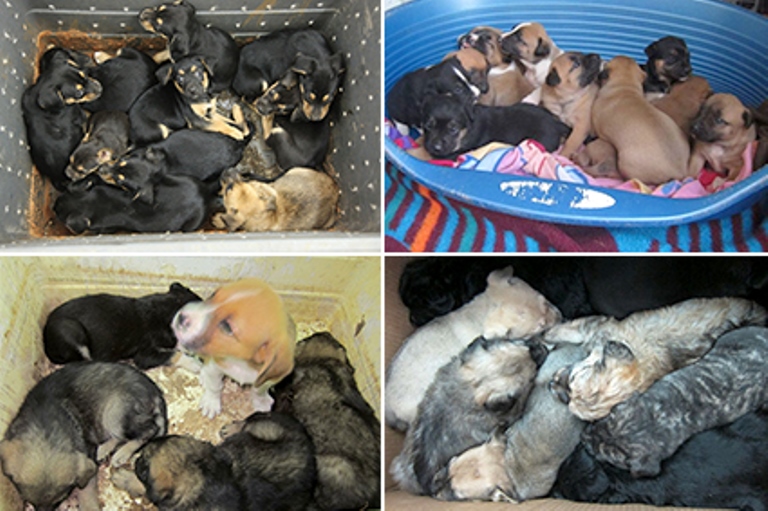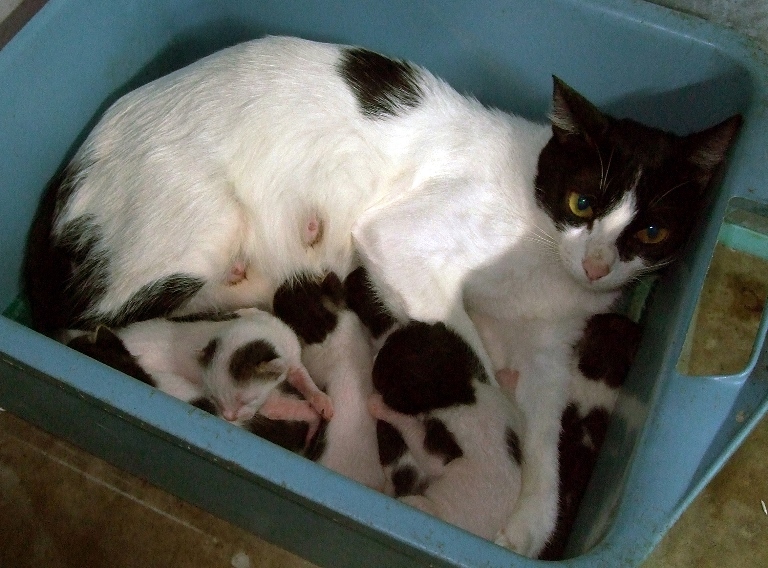The dog abandonment phenomena raises its ugly head
Yesterday was a hard day for the Society’s staff and volunteers, a day when 32 dogs were taken in and given shelter. These dogs, including 22 puppies under three months of age, were simply abandoned by their owners. A day when, as it came to a close, the abandoned dogs, who up till then were used to living in the security of their homes, found themselves in a strange environment with their futures and fates uncertain.
Abandoned dogs, including many puppies, reach the Society every day but yesterday was a record day, testifying more than anything else to the ugliness and cruelty of the abandonment phenomena. Dog lovers find it difficult to understand how a person or family can abandon their pets, but to our regret, most people who approach us with the intent of handing over their pets, don’t even try to find an alternate home themselves (thus sparing their pets being restricted to a shelter), and choose the easy solution of abandoning them in some organization, in the best case, or just on the street.
Most organizations and animal shelters close their gates in the face of these abandoned animals, claiming a shortage of space. Thus, by not offering any alternate solution, these organizations seal the fate of the dogs to be abandoned to the streets. In contrast, The Society for Prevention of Cruelty to Animals in Israel – Tel Aviv takes in any animal in need of shelter and protection. This has been the Society’s policy since the day it was founded, and was decided upon in order to protect abandoned animals that had been thrown out on the streets from further suffering and hardship. Apart from the fact that abandoning animals on the streets is against the Law, these animals find it hard to survive and are exposed to numerous dangers such as road accidents, illness, hunger, dehydration and abuse.
The reasons for abandoning dogs are varied and numerous; amongst the dogs taken in yesterday, there were two older dogs who were abandoned because their families had difficulty looking after them, a mother and two puppies whose owners had other dogs and were not able to bear the expenses involved in keeping them all, three one-year-old dogs who were found wandering around by passers-by, four six-week-old puppies whose owners couldn’t manage to rear so many dogs and eight one-month-old puppies who were found in a carton box on the street.
Then there was also one family with a complex story of its own, who brought in 13 dogs. We had come in contact with this Bat Yam family on an earlier occasion. A few months ago the father brought in three dogs which he left in the Society. The following day his wife arrived, burst into tears and begged to have her dogs returned to her. When we asked what she intended to do should her husband bring in the dogs again, she replied that they do not live together and assured us that she would not allow him to enter her house. Yesterday, the couple, accompanied by an acquaintance, brought in 13 dogs: The three older dogs that had been brought to us some months earlier, and ten one-month-old puppies. A short enquiry revealed that the seven-year-old bitch, who has had many litters and suffers from a skin ailment, is the mother of a four-year-old bitch, a one-year-old dog and four of the younger puppies. The other six puppies belong to the four-year-old bitch. Both litters were born a couple of days apart, just one month ago and, according to the woman, not only can the family not afford to rear them all, but she is also fed up cleaning up after them all day long. The husband urged the woman to leave the dogs and go without even filling out the requisite forms. He also made some other suggestions such as leaving the dogs on the street so that they would get run over, putting them in the deep freeze or scattering their ashes over the sea.
As noted, this is just one case of dog owners who don’t take responsibility for their actions, thus sentencing their pets to great suffering. In Israel, it is estimated that 100,000 dogs are abandoned every year. Regretfully, it is impossible to find adoptive homes for all of them since there are so few families willing to adopt. The outcome is that the dogs which are thrown on to the streets are either killed, spend extended periods of time in dog shelters or, in the absence of any other solution, undergo mercy killing. The only true, comprehensive solution, like so many other instances, must be at Government level, backed by considerable budgets.
Minimizing abandonment and unwanted litters is one of the aims of the Society, which works at several levels to deal with these phenomena:
1. Spaying and Neutering: For over thirty years we have been spaying and castrating every dog and cat that leaves for a new home, with no exception. This ensures that the animals we have given for adoption will not reproduce and will not bring unwanted young into the world. We are sorry to say that today, while there is higher awareness of the benefits of these procedures, many animal welfare organizations act irresponsibly and give un-spayed animals out for adoption. These animals are often brought in to the Society by their owners, and we know that they were adopted from other organizations by the data on their microchips.
2. Subsidizing Spaying and Neutering: The Society’s veterinary clinic, which is open seven days a week, offers these surgical procedures at subsidized rates, in order to encourage pet owners to have their animals treated without getting involved in very high expenses.
3. Education: The Society’s Department of Humanitarian Education runs numerous educational programs for groups of all ages, with the subject of spaying and neutering being one of the focal topics in the activities. The aim is to raise public awareness of the importance of this issue. In addition, the Society uses the media to bring the issue to the fore in the public agenda.
4. Law: Last week we heard that the License Fee Legislative Proposal (Bill for the Regularization of the Supervision of Dogs (Amendment – Neutering and Spaying Dogs) 2011), promoted by the Society, passed in the preliminary reading in the Knesset. The premise of the Proposal, which was submitted in collaboration with MK Eitan Cabel (Chairman of the Knesset Animal Protection Lobby) and MK’s Penina Kirshenbaum, Nitzan Horowitz and Dov Hanin, is the adjustment of the fee that dog-owners are required to pay to renew their dog license every year. The principle is that dog owners whose pets have not undergone neutering or spaying procedures will be required to pay NIS 700 more than dog owners whose pets have undergone the procedure.
5. Responsible Adoption: The society’s slogan, ”Loving Is Not Enough”, reflects our attitude towards animal adoption. Our experience shows that a low percentage of dogs live in one home all their lives. During their lives, most dogs move from one home to another a number of times because of adoption that was undertaken on a momentary impulse (especially in the case of puppies), or owners’ inability to provide for their pet’s needs. If more responsible people would adopt and raise spayed or castrated pets, there would be fewer unwanted litters born. The adoption process as it is carried out in the Society includes completing a questionnaire and taking part in an interview with an adoption counselor in order to ascertain which pet would best suit the family or person. Thus we attempt to ensure that the animals will be adopted into homes where they will live their entire lives. In addition, the adopters sign a form by which they undertake to return the animal to the Society should they decide to give the animal away. This is one way to ensure that the animals are not thrown onto the streets or passed from hand to hand in the event that they reach unsuitable homes.
We ask the general public to demonstrate responsibility towards the animals in their care, to spay or castrate them in order to prevent unwanted births, and to take advantage of the special prices offered by the Society for these procedures.
The thirty-two abandoned dogs are now awaiting adoptive homes, with the puppies being ready for adoption once they reach the age of three months, when they will get their first vaccinations and be spayed or castrated. When the wind whistles outside, the temperatures drop and winter is at its peak, think about the miserable, abandoned dogs. In the event that you are sure that you can offer a dog all its needs for the rest of its life, we invite you to make a Hanukah miracle happen, come to the Society, adopt a pet and give it a warm and loving home.



